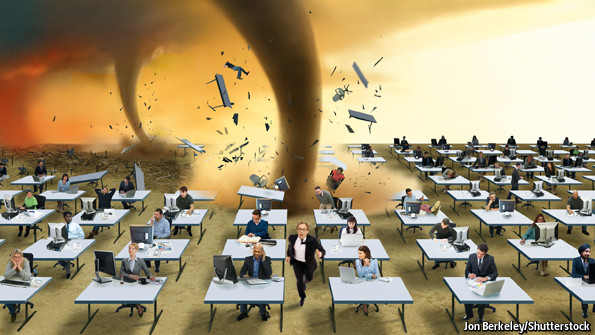Where will the new jobs come from ?
Posted by Big Gav in rise of the machines
The Economist has an article on the effect of technology on employment, declaring "The effect of today’s technology on tomorrow’s jobs will be immense — and no country is ready for it" -
Optimism remains the right starting-point, but for workers the dislocating effects of technology may make themselves evident faster than its benefits (see article). Even if new jobs and wonderful products emerge, in the short term income gaps will widen, causing huge social dislocation and perhaps even changing politics. Technology’s impact will feel like a tornado, hitting the rich world first, but eventually sweeping through poorer countries too. No government is prepared for it.Why be worried? It is partly just a matter of history repeating itself. In the early part of the Industrial Revolution the rewards of increasing productivity went disproportionately to capital; later on, labour reaped most of the benefits. The pattern today is similar. The prosperity unleashed by the digital revolution has gone overwhelmingly to the owners of capital and the highest-skilled workers. Over the past three decades, labour’s share of output has shrunk globally from 64% to 59%. Meanwhile, the share of income going to the top 1% in America has risen from around 9% in the 1970s to 22% today. Unemployment is at alarming levels in much of the rich world, and not just for cyclical reasons. In 2000, 65% of working-age Americans were in work; since then the proportion has fallen, during good years as well as bad, to the current level of 59%.
Worse, it seems likely that this wave of technological disruption to the job market has only just started. From driverless cars to clever household gadgets (see article), innovations that already exist could destroy swathes of jobs that have hitherto been untouched. The public sector is one obvious target: it has proved singularly resistant to tech-driven reinvention. But the step change in what computers can do will have a powerful effect on middle-class jobs in the private sector too.
Until now the jobs most vulnerable to machines were those that involved routine, repetitive tasks. But thanks to the exponential rise in processing power and the ubiquity of digitised information (“big data”), computers are increasingly able to perform complicated tasks more cheaply and effectively than people. Clever industrial robots can quickly “learn” a set of human actions. Services may be even more vulnerable. Computers can already detect intruders in a closed-circuit camera picture more reliably than a human can. By comparing reams of financial or biometric data, they can often diagnose fraud or illness more accurately than any number of accountants or doctors. One recent study by academics at Oxford University suggests that 47% of today’s jobs could be automated in the next two decades.
At the same time, the digital revolution is transforming the process of innovation itself, as our special report explains. Thanks to off-the-shelf code from the internet and platforms that host services (such as Amazon’s cloud computing), provide distribution (Apple’s app store) and offer marketing (Facebook), the number of digital startups has exploded. Just as computer-games designers invented a product that humanity never knew it needed but now cannot do without, so these firms will no doubt dream up new goods and services to employ millions. But for now they are singularly light on workers. When Instagram, a popular photo-sharing site, was sold to Facebook for about $1 billion in 2012, it had 30m customers and employed 13 people. Kodak, which filed for bankruptcy a few months earlier, employed 145,000 people in its heyday.
The problem is one of timing as much as anything. Google now employs 46,000 people. But it takes years for new industries to grow, whereas the disruption a startup causes to incumbents is felt sooner. Airbnb may turn homeowners with spare rooms into entrepreneurs, but it poses a direct threat to the lower end of the hotel business—a massive employer. ...
Innovation has brought great benefits to humanity. Nobody in their right mind would want to return to the world of handloom weavers. But the benefits of technological progress are unevenly distributed, especially in the early stages of each new wave, and it is up to governments to spread them. In the 19th century it took the threat of revolution to bring about progressive reforms. Today’s governments would do well to start making the changes needed before their people get angry.
One area where cheap machines have made a radical difference is outdoor adventure photography - the video below was shot with a $300 GoPro camera mounted on a $700 drone helicopter - total cost probably 2 orders of magnitude less than the gear to shoot equivalent footage would have cost 10 years ago.






